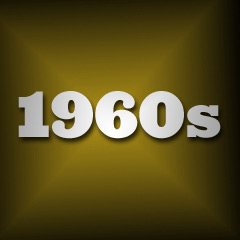
|
![]()
Greatest Films of the 1960s
1960 | 1961 | 1962 | 1963 | 1964 | 1965 | 1966 | 1967 | 1968 | 1969
Title Screen Film Genre(s), Title, Year, (Country), Length, Director, Description 


Alice's Restaurant (1969), 111 minutes, D: Arthur Penn
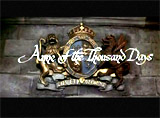


Anne of the Thousand Days (1969, UK), 145 minutes, D: Charles Jarrott


The Arrangement (1969), 125 minutes, D: Elia Kazan
Kazan's introspective, pretentious R-rated soap-opera melodrama (rated as one of his worst films), was based upon his own trashy best-selling 1967 novel. It was a bold, semi-experimental film with some nudity and sexual situations - representative of the very frank and honest films emerging in the late 1960s. It told about the mid-life crisis of middle-aged, rich, controlling LA ad executive Eddie Anderson (Kirk Douglas), a 2nd generation Greek immigrant - né Evangelos. Although unsatisfyingly married to beautiful, nagging loyal and smart-minded Florence (Deborah Kerr), Eddie was engaged in a long-running extra-marital affair with a beautiful mistress, his research assistant. He attempted suicide by deliberately steering his sports car convertible into the undercarriage of a truck next to him on the freeway. After surviving and hospitalization, and refusing to return to work, he subsequently explored and reevaluated his life and how he had squandered his own talent. He attempted to reorganize his contemptuous life - seemingly reduced to a series of perfect "arrangements" (compromises and adjustments) that had destroyed his self-respect. Numerous convoluted flashbacks revealed his affair (resulting in a child) with married, free-spirited mistress Gwen (Faye Dunaway), who had abandoned him a year earlier. She had told him that he had acquired a vacuous, empty soul after selling out himself to acquire a multi-million dollar ad contract with a tobacco company ("Zephyr—the Clean Cigarette!" ads played continually). At one point, she asked: "What you could have been. What happened to you, Eddie? Must kill you to think what you might have been."


Bob & Carol & Ted & Alice (1969), 104 minutes, D: Paul Mazursky
The fifth highest-grossing film of 1969, and with four Oscar nominations (one was for Mazursky's original screenplay) for Mazursky's directorial debut film. Set against the time period of the late 1960s sexual revolution, this social satire starred two bourgeois couples: documentary film-maker Bob Sanders (Robert Culp) and wife Carol (Natalie Wood), and Ted Henderson (Elliot Gould) and his wife Alice (Dyan Cannon). As a foursome, they experimented with New Age-y openness, enlightenment, therapy, and honesty - and the monogamous couples considered experimenting with swinging (or wife-swapping).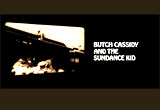


Butch Cassidy and the Sundance Kid (1969), 110 minutes, D: George Roy Hill
Director George Roy Hill's likeably entertaining, charming and amusing revisionist western was actually a comedy/drama and buddy film. Mixed together were impudent slapstick comedy, conventional Western action, contemporary music, and humorous dialogue to characterize the past and irreverently poke fun at typical western film cliches. It became one of the most-popular, appealing, beguilingly star-driven, tragi-comedy Westerns ever made. About two charming, legendary, turn-of-the-century, train-robbing outlaws - with comedy, drama, action, a witty script, and two handsome leads, Redford and Newman. The romanticized buddy film told of the friendship and camaraderie shared between the two handsome and humorous buddies, who mocked and defied authority and the Establishment. Their characters were loosely based on real-life, legendary outlaws Robert Leroy Parker (Butch Cassidy) and Harry Longbaugh (slick gunslinger The Sundance Kid) and the Hole in the Wall gang. The film's early 1900's anti-heroes were free-wheeling, non-chalant Butch (Paul Newman) and sharpshooting Sundance (Robert Redford), both with human fallible traits - their specialty was robbing trains, until they bungled their second attempt on the Union Pacific Express and were relentlessly pursued by authorities in a posse. With Sundance's beautiful, school-teacher lover Etta Place (Katharine Ross), they fled to Bolivia (after a brief stopover in NYC) to seek further wealth and better luck. In the end, they were outnumbered and died in a blazing, hail of bullets, freeze-frame shootout, reminiscent of Bonnie and Clyde (1967). The ending of their fateful last stand mythologized and immortalized the two outlaw heroes for posterity. Featured the Oscar-winning Best Song "Raindrops Keep Falling On My Head" while Etta and Butch shared a bicycle ride.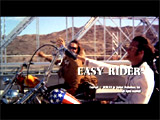



Easy Rider (1969), 94 minutes, D: Dennis Hopper
Widely considered a generation-defining, youth-oriented classic, Dennis Hopper's low-budget road film still engrosses those who remain nostalgic for 60's era wanderlust - seeking inspiration for the next road trip. Two motorcyclist biker outlaws (drug-dealers) (Peter Fonda, Dennis Hopper) embarked on a coast-to-coast odyssey across America in this landmark counter-culture road drama/travelogue, searching for the 'real' America. The film classic provided a scenic tour of parts of historic Route 66. Much of the early portion of their eastward odyssey was seen behind the opening credits, to the tune of Steppenwolf's 'Born to Be Wild.' The two drug-dealing motorcycling heroes began their journey in the dusty Death Valley desert of Ballarat, CA, then crossed the Colorado River and cruised to Flagstaff, AZ, then north through the Painted Desert to Monument Valley. In the Southwest, they encountered wide open spaces, hippies in a northern New Mexico commune, skinny-dipping in a Rio Grande River gorge near Taos, a parade in the tiny frontier town of Las Vegas, NM, small-town rednecks and paranoia, drugs, and a drunken, jailed lawyer (Jack Nicholson). When they arrived for Mardi Gras in New Orleans, they found sex in a bordello, a psychedelic trip in a graveyard, and a violent end outside of Baton Rouge. This often-imitated but never-duplicated movie defined a generation and has the greatest 60's soundtrack (featuring The Byrds, The Band, Steppenwolf, Jimi Hendrix, The Electric Prunes, and more). Made for $375,000, it went on to make multiple millions and change the pop culture landscape forever.

Fellini Satyricon (1969, It./Fr.) (aka Satyricon), 138 minutes, D: Federico Fellini
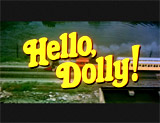

Hello, Dolly! (1969), 129 minutes, D: Gene Kelly




The Italian Job (1969, UK), 99 minutes, D: Peter Collinson


Kes (1969, UK), 110 minutes, D: Ken Loach


The Learning Tree (1969), 107 minutes, D: Gordon Parks


Medium Cool (1969), 110 minutes, D: Haskell Wexler
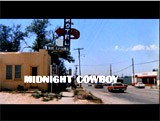


Midnight Cowboy (1969), 119 minutes, D: John Schlesinger
An exceptional, provocative, gritty buddy film - a poignant, downbeat, and tragic drama. It was a portrait of a naive, small-town Texan Joe Buck (Jon Voight), a slow-witted, pretty-boy blonde, who transplanted himself to NYC. He unexpectedly became an unsuccessful male prostitute-gigolo in Manhattan. Out of necessity, he was forced to befriend slimy, tubercular, limping, homeless, petty thief and con artist Enrico "Ratso" Rizzo (Dustin Hoffman), the film's anti-hero, who dreamt of making it rich in sunny Florida. The two established interdependent bonds of love and trust in the big city, both hoping for a better life elsewhere. The unglamorous, sickly Rizzo bonded with the disillusioned drifter and together they struggled to live a marginalized existence in American society. Once-controversial because it was originally rated X, this adult-oriented, Oscar-winning Best Picture film was made on location in New York to portray seediness, corruption, and big-city anonymity, and based on James Leo Herlihy's novel.
Model Shop (1969, Fr./US), 95 minutes, D: Jacques Demy
This was the only American feature by French auteur Jacques Demy - a poignant and downbeat drama about a transitory romance and dislocated protagonist in the late 1960s - with the intriguing dreamlike tagline: "Maybe Tomorrow. Maybe Never. Maybe." The film followed 24 hours in the life of directionless, alienated, idealistic and unemployed 26 year-old Los Angeles resident George Matthews (Gary Lockwood), an architect by training. The aimless Angeleno was on the verge of receiving a draft notice and being shipped off to the Vietnam War. Dissatisfied and in a loveless relationship with long-time, dim-witted live-in girlfriend, aspiring blonde actress-model Gloria (Alexandra Hay) (who would soon move out), George also was struggling to raise $100 for his creditors to prevent his vintage MG sports car convertible from being repossessed. He became infatuated with Frenchwoman Cecile (stage-named Lola) (Anouk Aimée), elegantly dressed entirely in white, and at first silently followed her. He learned she was a divorced, world-weary transplanted (and stranded) Parisian who worked in a tawdry "model shop" storefront where patrons rented cameras to take erotic photos of scantily-clad lingerie models - and spent his last $12 to photograph her (for 15 minutes). Her plan was to raise money to return to Paris and her 14 year-old son. After a brief one-night stand and their tenuous passionate connection, he and Lola parted ways, with little possibility of escaping or finding freedom from their circumstances.



The Prime of Miss Jean Brodie (1969, UK), 116 minutes, D: Ronald Neame


The Sorrow and the Pity (1969, Fr./Switz./W.Germ.) (aka Le Chagrin et La Pitié), 251 minutes, D: Marcel Ophüls


Take the Money and Run (1969), 85 minutes, D: Woody Allen
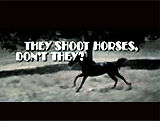

They Shoot Horses, Don't They? (1969), 129 minutes, D: Sydney Pollack
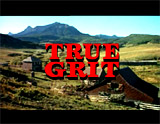

True Grit (1969), 128 minutes, D: Henry Hathaway
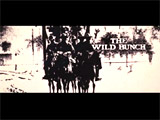

The Wild Bunch (1969), 145 minutes, D: Sam Peckinpah
A controversial, brutally-violent, late 60s Western about the demise of a desperate, small gang of aging outlaws in the early 1900s that still clings to codes of honor, loyalty, and courage. Pike Bishop (William Holden), leader of the 'wild bunch,' is hired for their final job. In the stunning opening sequence, the gang - disguised as US Cavalry soldiers, ride into a Texas town and rob the railway office's bank. The boss of the railroad hires a mercenary, bounty-hunting posse, led by Pike's former buddy Deke Thornton (Robert Ryan) to pursue them, as the gang flees into Mexico, during the revolution of 1914. They are double-crossed by an anti-revolutionary dictator/Generalissimo Mapache (Emilio Fernandez) after the hijacking of weapons from a US ammunitions train. Attempting to redeem themselves by opposing an entire corrupt Mexican platoon, they are massacred in the famous, ultra-violent, slow-motion, colorful bloodbath finale.




Women in Love (1969, UK), 131 minutes, D: Ken Russell
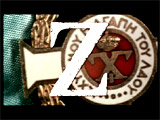
Z (1969, Fr./Algeria), 128 minutes, D: Costa-Gavras